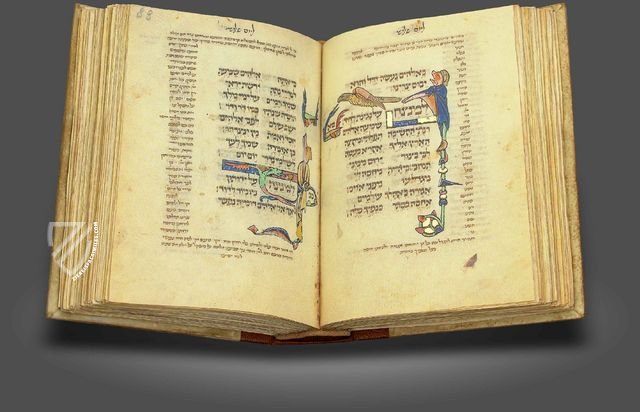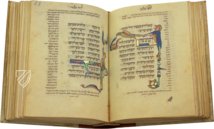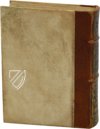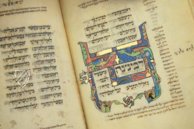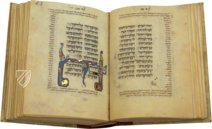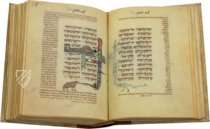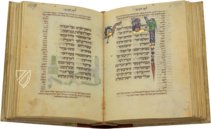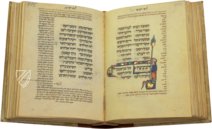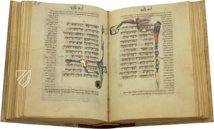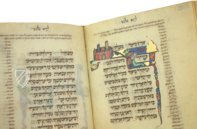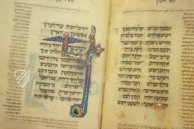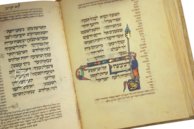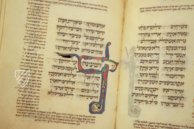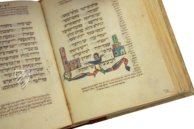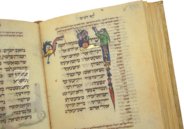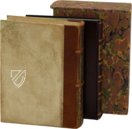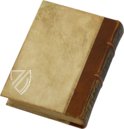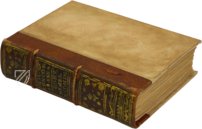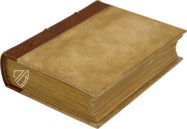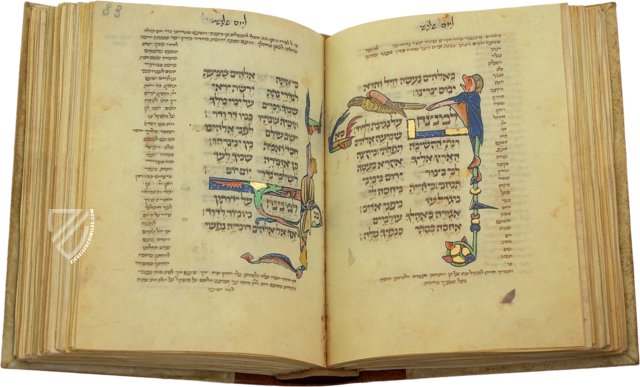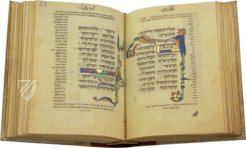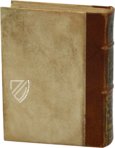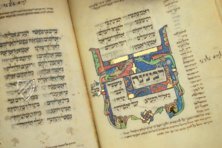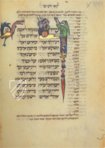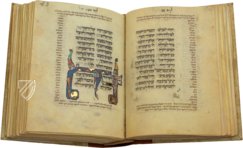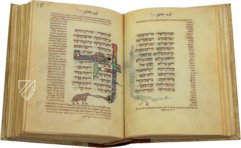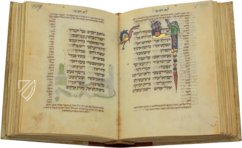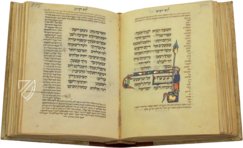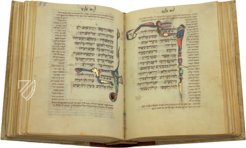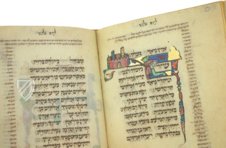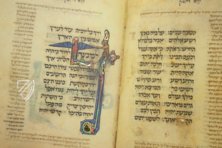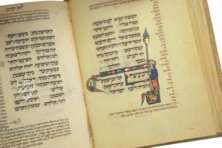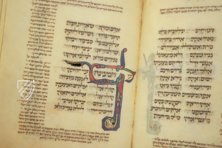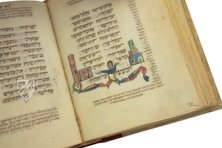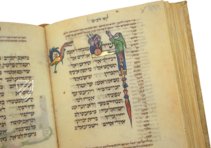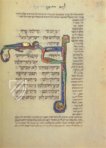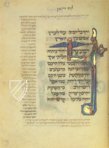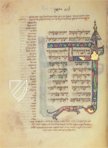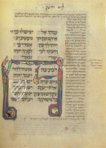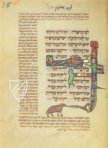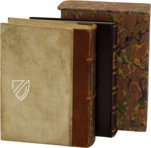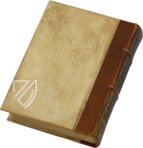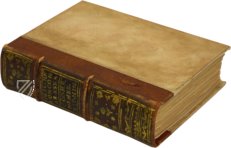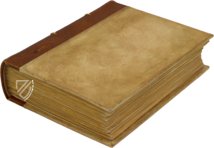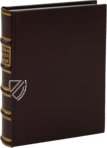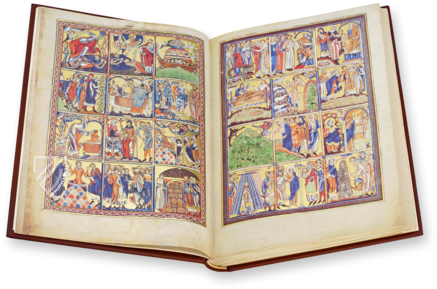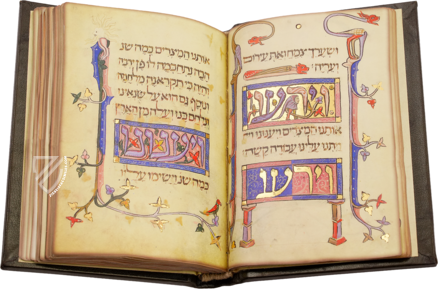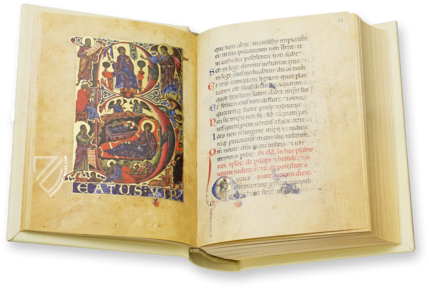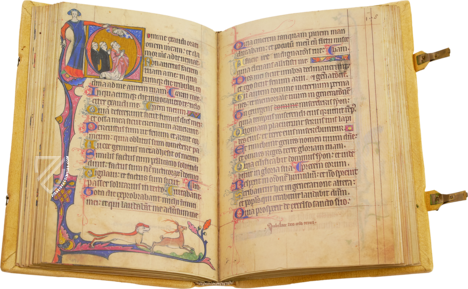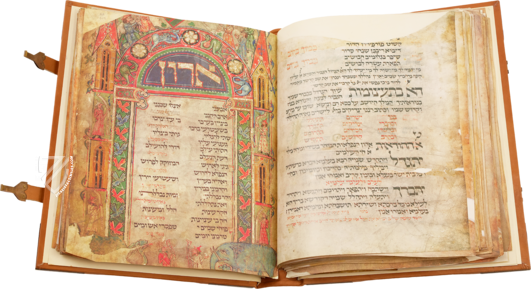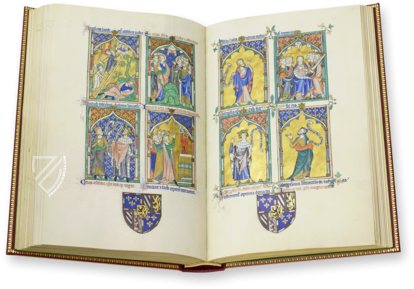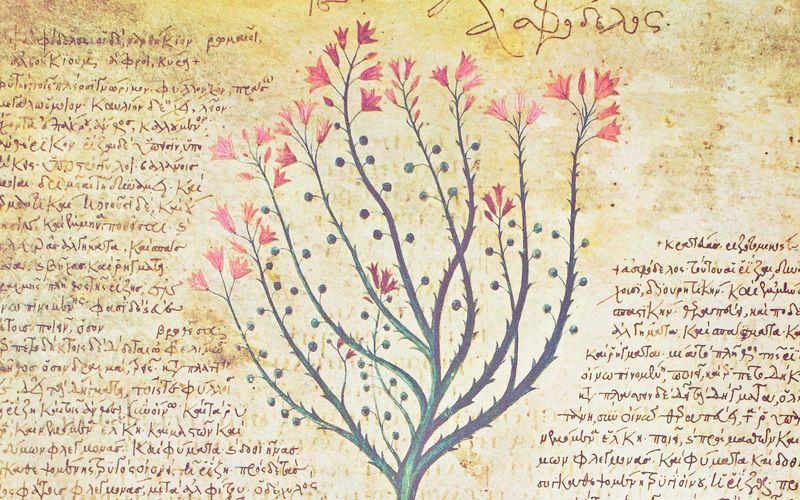Parma Psalter
(3,000€ - 7,000€)
The so-called Parma Psalter is considered to be one of the most impressive Hebrew manuscripts in the history of illumination. The Hebrew manuscript was made ca. 1280 in Northern Italy for a wealthy patron. Gorgeous ornamentation with figurative elements, precious gold, and grandiose compositions illustrate the 150 Psalms, which are of special significance for the Jewish religion and culture: the Psalms were recited at particular occasions – in everyday life or for special events. In this way, alongside its status as an outstanding piece of 13th century art, it offers a gorgeous glimpse into medieval Jewish culture!
Parma Psalter
The so-called Parma Psalter is considered to be one of the most impressive Hebrew manuscripts in the history of illumination. The Hebrew manuscript was made ca. 1280 in Northern Italy for a wealthy patron. Gorgeous ornamentation with figurative elements, precious gold, and grandiose compositions illustrate the 150 Psalms, which are of special significance for the Jewish religion and culture: the Psalms were recited at particular occasions – in everyday life or for special events. In this way, alongside its status as an outstanding piece of 13th century art, it offers a gorgeous glimpse into medieval Jewish culture!
The Significance of the Psalms
Codex MS. Parm. 1870 (De Rossi 510) of the Bibilioteca Palatina in Parma, Italy is considered to be one of the most impressive Hebrew manuscripts and a special gem of the collections. The manuscript is a book of Psalms, also known as a Tehillim. One such Psalm-book had great significance for the Jewish religion and culture. The Psalms were spoken at fixed times of day and events, e.g. at weddings, circumcisions, or on the Sabbath. These significant ceremonies are additionally elucidated in the manuscript.
Psalm-Illustrations
The Parma Psalter originated at the behest of a rich northern Italian patron ca. 1280. The 150 Psalms are gorgeously illustrated on the manuscript’s 452 pages measuring 13.5 x 10 cm. Artful ornamentation, sometimes featuring figurative elements, adorn the pages of the Hebrew psalter. The high-quality paintings were additionally ennobled with gold leaf. The gorgeous compositions of the scenes are comprised of magnificently creative pictorial adornments – animals, people, and fantastical creatures for various themes. At the same time, a special focus is placed thematically on music. Therefore, various historical musical instruments, inter alia, are illustrated – something rarely found in the art of the time. These miniatures, which illustrated the content of the Psalms, account for the special charm of the Parma Psalter!
A Rare Psalm-Commentary
The Parma manuscript found itself in the possession of Giovanni Bernardo de Rossi, a significant Christian Hebraist who made the manuscript famous. Alongside the 150 Psalms, the Parma Psalter contains a special feature: the famous commentary by Abraham Ibn Esra. He was an important Jewish poet and scholar of the 12th century. His famous commentary on the Psalms has rarely been handed down from this time. The Parma Psalter presents itself as an impressive testimonial to Jewish scholarship in the Middle Ages!
Codicology
- Alternative Titles
- Tehillim
Parma-Psalter - Size / Format
- 452 pages / 13.5 × 10.0 cm
- Origin
- Italy
- Date
- Ca. 1280
- Epochs
- Style
- Genre
- Language
- Illustrations
- Each of the 150 psalms is illuminated
- Previous Owners
- Giovanni Bernardo De Rossi (1742–1831)
Parma Psalter
Psalms 10 and 11
A large eagle with spread wings is perched to the left of the initial word and between the text of the two Psalms. In his verses, the Psalmist protests: In the Lord I put my trust; How can you say to my soul, “Flee as a bird to your mountain”? For look! The wicked bend their bow, They make ready their arrow on the string… (Ps. 11:1-2) The tip of its left wing is held by an enigmatic ape, who is likely just ornamental, sitting atop the initial letter and wearing a tall golden headdress.
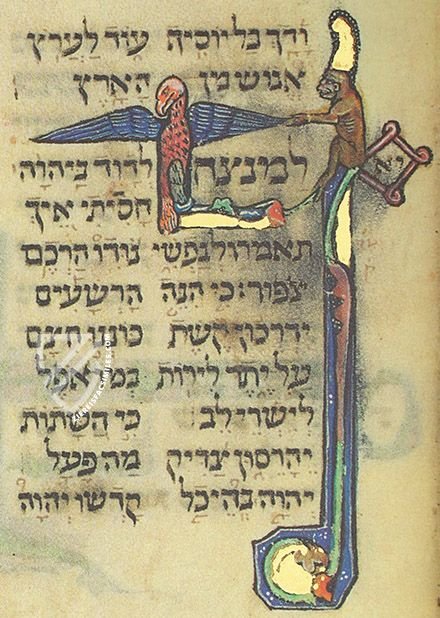
Parma Psalter
Psalm 15
Hebrew manuscripts often feature drolleries of humans with animal heads, and although subtle, here we see a man with the face of a dog. Standing behind a small golden mountain, he is under a bell tent with blue and gold bands that is topped by a golden fleur-de-lis. The opening verse of this Psalm asks: Lord, who may abide in Your tabernacle? Who may dwell on Your holy hill? (Ps. 15:1)
The text and imagery together suggest that gold may have been a corrupting force for both the tent of the Lord and for the Temple Mount – the Temple of Solomon – that succeeded it as the earthly dwelling place of Yahweh. At the bottom of the page, a lanky hound dog with visible ribs snags a bite of the initial letter, completing the canine motif.
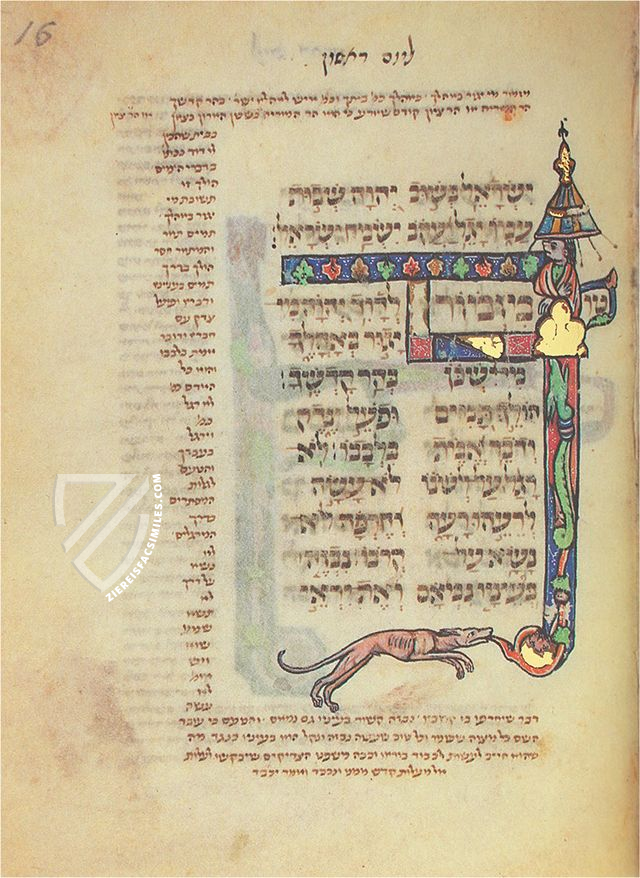
#1 The Parma Psalter
Language: English
(3,000€ - 7,000€)
- Treatises / Secular Books
- Apocalypses / Beatus
- Astronomy / Astrology
- Bestiaries
- Bibles / Gospels
- Chronicles / History / Law
- Geography / Maps
- Saints' Lives
- Islam / Oriental
- Judaism / Hebrew
- Single Leaf Collections
- Leonardo da Vinci
- Literature / Poetry
- Liturgical Manuscripts
- Medicine / Botany / Alchemy
- Music
- Mythology / Prophecies
- Psalters
- Other Religious Books
- Games / Hunting
- Private Devotion Books
- Other Genres
- Afghanistan
- Armenia
- Austria
- Belgium
- Belize
- Bosnia and Herzegovina
- China
- Colombia
- Costa Rica
- Croatia
- Cyprus
- Czech Republic
- Denmark
- Egypt
- El Salvador
- Ethiopia
- France
- Germany
- Greece
- Guatemala
- Honduras
- Hungary
- India
- Iran
- Iraq
- Israel
- Italy
- Japan
- Jordan
- Kazakhstan
- Kyrgyzstan
- Lebanon
- Liechtenstein
- Luxembourg
- Mexico
- Morocco
- Netherlands
- Palestine
- Panama
- Peru
- Poland
- Portugal
- Romania
- Russia
- Serbia
- Spain
- Sri Lanka
- Sweden
- Switzerland
- Syria
- Tajikistan
- Turkey
- Turkmenistan
- Ukraine
- United Kingdom
- United States
- Uzbekistan
- Vatican City
- A. Oosthoek, van Holkema & Warendorf
- Aboca Museum
- Ajuntament de Valencia
- Akademie Verlag
- Akademische Druck- u. Verlagsanstalt (ADEVA)
- Aldo Ausilio Editore - Bottega d’Erasmo
- Alecto Historical Editions
- Alkuin Verlag
- Almqvist & Wiksell
- Amilcare Pizzi
- Andreas & Andreas Verlagsbuchhandlung
- Archa 90
- Archiv Verlag
- Archivi Edizioni
- Arnold Verlag
- ARS
- Ars Magna
- Art Market
- ArtCodex
- AyN Ediciones
- Azimuth Editions
- Badenia Verlag
- Bärenreiter-Verlag
- Belser Verlag
- Belser Verlag / WK Wertkontor
- Benziger Verlag
- Bernardinum Wydawnictwo
- BiblioGemma
- Biblioteca Apostolica Vaticana (Vaticanstadt, Vaticanstadt)
- Bibliotheca Palatina Faksimile Verlag
- Bibliotheca Rara
- Boydell & Brewer
- Bramante Edizioni
- Bredius Genootschap
- Brepols Publishers
- British Library
- C. Weckesser
- Caixa Catalunya
- Canesi
- CAPSA, Ars Scriptoria
- Caratzas Brothers, Publishers
- Carus Verlag
- Casamassima Libri
- Centrum Cartographie Verlag GmbH
- Chavane Verlag
- Christian Brandstätter Verlag
- Circulo Cientifico
- Club Bibliófilo Versol
- Club du Livre
- CM Editores
- Collegium Graphicum
- Collezione Apocrifa Da Vinci
- Comissão Nacional para as Comemorações dos Descobrimentos Portugueses
- Coron Verlag
- Corvina
- CTHS
- D. S. Brewer
- Damon
- De Agostini/UTET
- De Nederlandsche Boekhandel
- De Schutter
- Deuschle & Stemmle
- Deutscher Verlag für Kunstwissenschaft
- DIAMM
- Dropmore Press
- Droz
- E. Schreiber Graphische Kunstanstalten
- Ediciones Boreal
- Ediciones Grial
- Ediclube
- Edições Inapa
- Edilan
- Editalia
- Edition Deuschle
- Edition Georg Popp
- Edition Leipzig
- Edition Libri Illustri
- Editiones Reales Sitios S. L.
- Éditions de l'Oiseau Lyre
- Editions Medicina Rara
- Editorial Casariego
- Editorial Mintzoa
- Editrice Antenore
- Editrice Velar
- Edizioni Edison
- Egeria, S.L.
- Eikon Editores
- Electa
- Emery Walker Limited
- Enciclopèdia Catalana
- Eos-Verlag
- Ephesus Publishing
- Ernst Battenberg
- Eugrammia Press
- Extraordinary Editions
- Fackelverlag
- Facsimila Art & Edition
- Facsimile Editions Ltd.
- Facsimilia Art & Edition Ebert KG
- Faksimile Verlag
- Feuermann Verlag
- Folger Shakespeare Library
- Franco Cosimo Panini Editore
- Friedrich Wittig Verlag
- Fundación Hullera Vasco-Leonesa
- G. Braziller
- Gabriele Mazzotta Editore
- Gebr. Mann Verlag
- Gesellschaft für graphische Industrie
- Getty Research Institute
- Giovanni Domenico de Rossi
- Giunti Editore
- Graffiti
- Grafica European Center of Fine Arts
- Guido Pressler
- Guillermo Blazquez
- Gustav Kiepenheuer
- H. N. Abrams
- Harrassowitz
- Harvard University Press
- Helikon
- Hendrickson Publishers
- Henning Oppermann
- Herder Verlag
- Hes & De Graaf Publishers
- Hoepli
- Holbein-Verlag
- Houghton Library
- Hugo Schmidt Verlag
- Idion Verlag
- Il Bulino, edizioni d'arte
- ILte
- Imago
- Insel Verlag
- Insel-Verlag Anton Kippenberger
- Instituto de Estudios Altoaragoneses
- Instituto Nacional de Antropología e Historia
- Introligatornia Budnik Jerzy
- Istituto dell'Enciclopedia Italiana - Treccani
- Istituto Ellenico di Studi Bizantini e Postbizantini
- Istituto Geografico De Agostini
- Istituto Poligrafico e Zecca dello Stato
- Italarte Art Establishments
- Jan Thorbecke Verlag
- Johnson Reprint Corporation
- Johnson Reprint Corporation
- Josef Stocker
- Josef Stocker-Schmid
- Jugoslavija
- Karl W. Hiersemann
- Kasper Straube
- Kaydeda Ediciones
- Kindler Verlag / Coron Verlag
- Kodansha International Ltd.
- Konrad Kölbl Verlag
- Kurt Wolff Verlag
- La Liberia dello Stato
- La Linea Editrice
- La Meta Editore
- Lambert Schneider
- Landeskreditbank Baden-Württemberg
- Leo S. Olschki
- Les Incunables
- Liber Artis
- Library of Congress
- Libreria Musicale Italiana
- Lichtdruck
- Lito Immagine Editore
- Lumen Artis
- Lund Humphries
- M. Moleiro Editor
- Maison des Sciences de l'homme et de la société de Poitiers
- Manuscriptum
- Martinus Nijhoff
- Maruzen-Yushodo Co. Ltd.
- MASA
- Massada Publishers
- McGraw-Hill
- Metropolitan Museum of Art
- Militos
- Millennium Liber
- Müller & Schindler
- Nahar - Stavit
- Nahar and Steimatzky
- National Library of Wales
- Neri Pozza
- Nova Charta
- Oceanum Verlag
- Odeon
- Omnia Arte
- Orbis Mediaevalis
- Orbis Pictus
- Österreichische Staatsdruckerei
- Oxford University Press
- Pageant Books
- Parzellers Buchverlag
- Patrimonio Ediciones
- Pattloch Verlag
- PIAF
- Pieper Verlag
- Plon-Nourrit et cie
- Poligrafiche Bolis
- Presses Universitaires de Strasbourg
- Prestel Verlag
- Princeton University Press
- Prisma Verlag
- Priuli & Verlucca, editori
- Pro Sport Verlag
- Propyläen Verlag
- Pytheas Books
- Quaternio Verlag Luzern
- Reales Sitios
- Recht-Verlag
- Reichert Verlag
- Reichsdruckerei
- Reprint Verlag
- Riehn & Reusch
- Roberto Vattori Editore
- Rosenkilde and Bagger
- Roxburghe Club
- Salerno Editrice
- Saltellus Press
- Sandoz
- Sarajevo Svjetlost
- Schöck ArtPrint Kft.
- Schulsinger Brothers
- Scolar Press
- Scrinium
- Scripta Maneant
- Scriptorium
- Shazar
- Siloé, arte y bibliofilia
- SISMEL - Edizioni del Galluzzo
- Sociedad Mexicana de Antropología
- Société des Bibliophiles & Iconophiles de Belgique
- Soncin Publishing
- Sorli Ediciones
- Stainer and Bell
- Studer
- Styria Verlag
- Sumptibus Pragopress
- Szegedi Tudomànyegyetem
- Taberna Libraria
- Tarshish Books
- Taschen
- Tempus Libri
- Testimonio Compañía Editorial
- TGB Limited Editions
- Thames and Hudson
- The Clear Vue Publishing Partnership Limited
- The Facsimile Codex
- The Folio Society
- The Marquess of Normanby
- The Richard III and Yorkist History Trust
- Tip.Le.Co
- TouchArt
- TREC Publishing House
- TRI Publishing Co.
- Trident Editore
- Tuliba Collection
- Typis Regiae Officinae Polygraphicae
- Union Verlag Berlin
- Universidad de Granada
- Universitaire Bibliotheken Leiden
- University of California Press
- University of Chicago Press
- Urs Graf
- Vallecchi
- Van Wijnen
- VCH, Acta Humaniora
- VDI Verlag
- VEB Deutscher Verlag für Musik
- Verlag Anton Pustet / Andreas Verlag
- Verlag Bibliophile Drucke Josef Stocker
- Verlag der Münchner Drucke
- Verlag für Regionalgeschichte
- Verlag Styria
- Vicent Garcia Editores
- W. Turnowski Ltd.
- W. Turnowsky
- Waanders Printers
- Wiener Mechitharisten-Congregation (Wien, Österreich)
- Wissenschaftliche Buchgesellschaft
- Wissenschaftliche Verlagsgesellschaft
- Wydawnictwo Dolnoslaskie
- Xuntanza Editorial
- Zakład Narodowy
- Zollikofer AG

